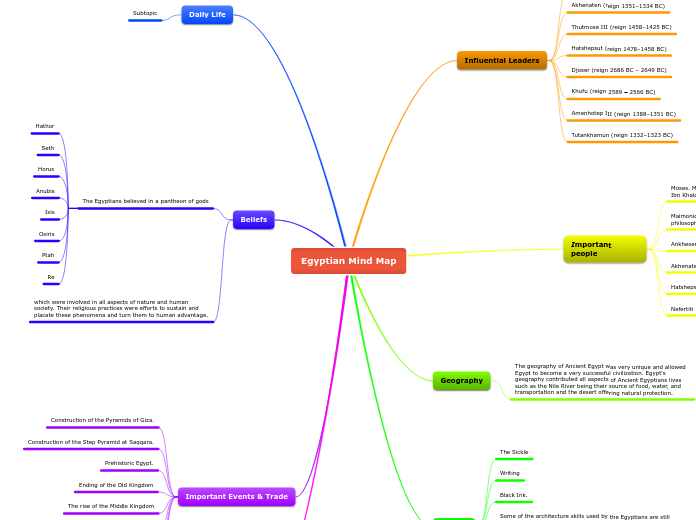
Ramses II (reign 1279–1213 BC)
Akhenaten (reign 1351–1334 BC)
Thutmose III (reign 1458–1425 BC)
Hatshepsut (reign 1478–1458 BC)
Djoser (reign 2686 BC – 2649 BC)
Khufu (reign 2589 ‒ 2566 BC)
Amenhotep III (reign 1388–1351 BC)
Tutankhamun (reign 1332–1323 BC)
Moses. Moses was a religious leader in Egypt in 1391 BC. ...
Ibn Khaldun. Ibn Khaldun was a historiographer and historian.
Maimonides. Maimonides was a very well-known Jewish philosopher.
Ankhesenamun
Akhenaten
Hatshepsut
Nefertiti
The geography of Ancient Egypt was very unique and allowed Egypt to become a very successful civilization. Egypt's geography contributed all aspects of Ancient Egyptians lives such as the Nile River being their source of food, water, and transportation and the desert offering natural protection.
The Sickle
Writing
Black Ink.
Some of the architecture skills used by the Egyptians are still used today. The Ancient Egyptians created massive temples and monuments such as large pyramids, most of which are still standing today.
Subtopic
Papyrus Sheets.
Irrigation
Subtopic
The Egyptians believed in a pantheon of gods
Hathor
Seth
Horus
Anubis
Isis
Osiris
Ptah
Re
which were involved in all aspects of nature and human society. Their religious practices were efforts to sustain and placate these phenomena and turn them to human advantage.
Construction of the Pyramids of Giza.
Construction of the Step Pyramid at Saqqara.
Prehistoric Egypt.
Ending of the Old Kingdom
The rise of the Middle Kingdom
Second Intermediate Period.
The rise of the New Kingdom
Third Intermediate Period.
the reason that i believe that we should be learning about
the history is cause we could learn about our ancestors, we can also learn from their mistakes so we don't make them on our own